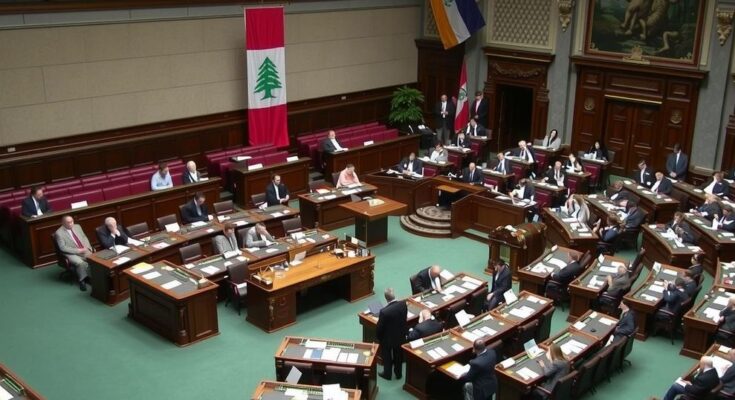Lebanon’s parliament is making another attempt to elect a president after a two-year vacancy. Army commander Joseph Aoun is the leading candidate, having gained endorsements after the withdrawal of another contender. The process is complicated by constitutional barriers and the need for a two-thirds majority. The new president will face urgent economic challenges amidst Lebanon’s ongoing crisis.
On Thursday, Lebanon’s parliament is set to attempt to elect a president, seeking to fill the vacancy that has persisted for more than two years since the term of former President Michel Aoun ended in October 2022. There have been twelve unsuccessful attempts to appoint a successor; however, indications suggest that the forthcoming vote may indeed result in the election of a new head of state. The army commander Joseph Aoun is emerging as the frontrunner for the role, widely perceived as favored by both the United States and Saudi Arabia, especially in light of Lebanon’s need for support in the aftermath of the recent conflict with Israel.
Previously, Joseph Aoun faced competition from Suleiman Frangieh, a candidate supported by Hezbollah. Nonetheless, Frangieh announced his withdrawal from the race on Wednesday, endorsing Aoun and potentially paving the way for his election. Lebanon’s complex sectarian power-sharing arrangement has historically led to political stalemates, complicating the election process, which has previously resulted in extended presidential vacancies.
Due to his status as a serving army commander, Joseph Aoun encounters constitutional challenges that technically prohibit him from being president. The conditions necessitate that he must secure a two-thirds majority vote even during the second round of the election, a requirement not typically needed for other candidates. Alongside him, other candidates include Jihad Azour, a former finance minister, and Elias al-Baysari, the acting head of Lebanon’s General Security agency. The new president will be essential in appointing a permanent prime minister and forming a cabinet, as the current caretaker government has diminished authority due to the absence of an elected president.
Among the challenges facing Lebanon in the wake of electing a new president include overcoming a debilitating economic crisis exacerbated by the conflict with Israel and a cumbersome political landscape that requires urgent reforms. The economy, severely impacted over the past six years, demands decisive action to address the areas of infrastructure and public services, culminating in widespread challenges for the incoming administration.
Lebanon has undergone significant political instability, characterized by prolonged periods without a president. The current presidential vacancy, extending over two years following Michel Aoun’s departure, has prompted parliamentary efforts to elect a successor. The 128-member parliament operates on a sectarian power-sharing system that complicates election processes, often resulting in electoral deadlock. Furthermore, Lebanon’s economic turmoil, compounded by conflicts with regional powers, necessitates strong leadership to implement urgent reforms and recovery strategies.
In conclusion, Lebanon’s parliament faces a pivotal moment as it attempts to elect a new president after a lengthy vacancy. The candidacy of Joseph Aoun, favored by key international players, raises hopes for potential stabilization and reconstruction in the country. However, complexities surrounding his constitutional eligibility and the broader political landscape pose substantial challenges ahead.
Original Source: www.hindustantimes.com




